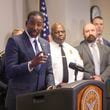A 1946 U.S. Supreme Court decision ruled segregated seating on interstate buses was unconstitutional.
In 1960, the justices ruled that segregation of transportation facilities – bus terminals, bathrooms and restaurants within the terminals – was unconstitutional.
Throughout the South, however, these rulings were basically ignored.
So in the spring of 1961, a group of seven black and six white activists organized by the Congress of Racial Equality put the decisions to the test by riding Greyhound and Trailways buses from Washington D.C. through the Deep South. The Freedom Riders, as they were called, also planned to use "whites only" restrooms and sit at "whites only" lunch counters.
The buses were met by angry whites in many cities, and police often would give the mobs 10-15 minutes to beat the activists before putting a stop to the violence.
"In Birmingham (Ala.) it was mostly fists, … and they forcefully threw us to the back of the bus," said Charles Person, a Morehouse College student at the time and, at 18, the youngest of the CORE Freedom Riders. "What prevented me from getting more savagely beaten was, two of the white riders came to my rescue."
“In our fight for freedom, we had allies,” said Atlanta businessman and civil rights activist Hank Thomas, who was a Howard University student when he joined the Freedom Riders. "Just like the defeat of Germany involved Allies, we had allies. And our allies were the American Jews. Fifty percent of all the Freedom Riders eventually were white.”
Added Dr. William Harbour: “And I really believe that if we didn’t have the participation of the young white students we wouldn’t have been this far, as far as progress in the United States.”
MLK COVERAGE
About the Author






